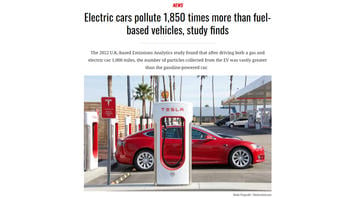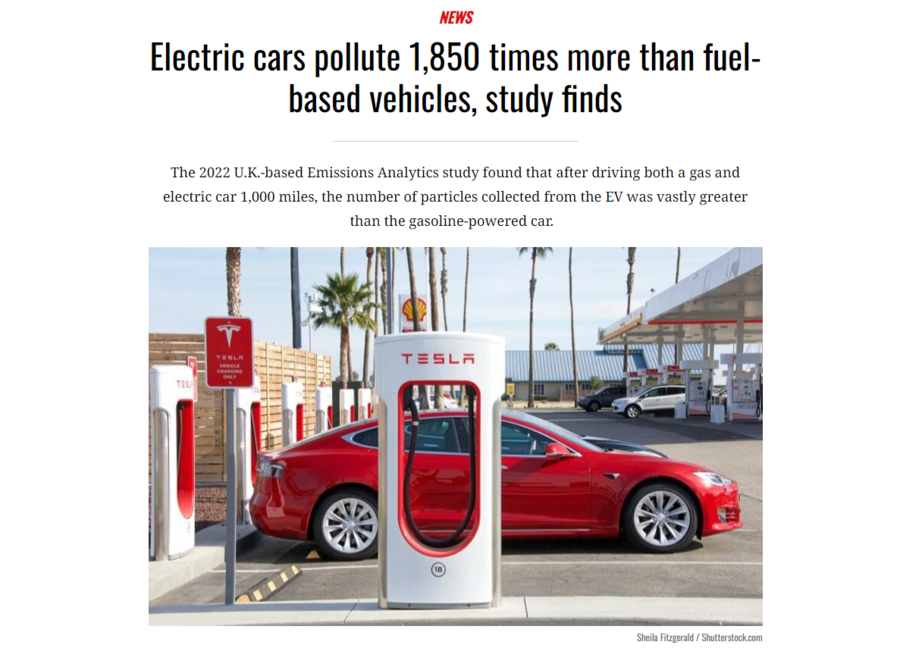
Did a study find that electric cars pollute 1,850 times more than fuel-based vehicles, as some online publications reported when posted about the study? No, that's not true: The "study" in question was an analysis published by an independent emissions research group, not a science journal article. The group's spokesperson told Lead Stories that some online publications misrepresented the analysis. The analysis found that tire wear emissions are 1,850 times greater under some driving conditions than tailpipe particulate mass emissions. The analysis did not compare between fuel and electric vehicles, nor did it look at other forms of pollutants emitted from tailpipes, as some online articles suggested.
The claim originated in an article published by LifeSiteNews on March 8, 2024, (archived here) and titled, "Electric cars pollute 1,850 times more than fuel-based vehicles, study finds." It opened:
The 2022 U.K.-based Emissions Analytics study found that after driving both a gas and electric car 1,000 miles, the number of particles collected from the EV was vastly greater than the gasoline-powered car.
(LifeSiteNews) -- A 2022 study found that electric vehicles (EVs) which left-leaning governments in Canada, the United States, and elsewhere are pushing on the population, pollute at a rate far higher than their gasoline or diesel-powered counterparts.
The 2022 study from the U.K.-based Emissions Analytics group found that during a 1,000 mile journey, EVs release 1,850 times more pollutants into the surrounding environment than gas-powered vehicles, due to the heavier weight which eats through tires.
Below is how the post appeared at the time of the publication of this fact check:
(Source: LifeSiteNews screenshot taken Thurs March 14 14:18:00 UTC 2024)
The "study" linked in the article led to an analysis, published by Emission Analytics on May 10, 2022, that is titled, "Gaining traction, losing tread Pollution from tire wear now 1,850 times worse than exhaust emissions" (archived here). Emission Analytics is a UK-based research institution that describes (archived here) itself as "the leading independent global testing and data specialist for the scientific measurement of real-world emissions."
Nick Molden, founder and CEO of Emission Analytics (archived here), told Lead Stories in a phone interview on March 18, 2024, that the findings of his paper were misrepresented by some online news publications.
As part of their analysis, Emissions Analytics compared "real-world tailpipe particulate mass emissions to tire wear emissions, both in 'normal' driving" and found that "the latter is actually around 1,850 times greater than the former."
In other words, tire wear emissions under normal driving conditions are 1,850 times greater than tailpipe particulate mass emissions, one form of pollutants that Molden described as tiny, invisible particles that don't represent all emissions expelled from the tailpipes of fuel-powered vehicles.
The analysis did not compare fuel to electric vehicles, as the articles on LifeSiteNews claimed.
"It's wrong to infer that we're saying there's nothing else coming out of a tailpipe. There is a large amount of C02 [carbon dioxide], and that's why electric vehicles are a very good way of reducing C02 [but] they do have problem with tire particle [emissions]," Molden told Lead Stories. "EVs [electric vehicles] reduce C02 by about 50 percent but tend to increase particles by about 25 percent."
Like-for-like, EVs tend to weigh around 800 pounds more than internal combustion or fuel-powered vehicles, according to Molden. EVs also impart a huge force that allows them to accelerate much quicker.
As part of their research, Molden said his company tested dozens of vehicles under real-world driving conditions. Emissions Analytics also noted that these figures require "careful interpretation." Its article noted that:
The fundamental trends that drive this ratio are: tailpipe particulate emissions are much lower on new cars, and tire wear emissions increase with vehicle mass and aggressiveness of driving style. Tailpipe emissions are falling over time, as exhaust filters become more efficient and with the prospect of extending the measurement of particulates under the potential future Euro 7 regulation, while tire wear emissions are rising as vehicles become heavier and added power and torque is placed at the driver's disposal. On current trends, the ratio may well continue to increase.
The research builds on a 2020 analysis (archived here) that determined tire particulate wear emissions were 1,000 times worse than exhaust emissions under certain conditions and with specific vehicles. These findings are not necessarily representative of standard cars driven around the world nor under the various circumstances for which they are used.
Other Lead Stories fact checks of claims related to electric vehicles can be found here.













